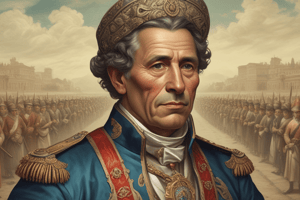Podcast
Questions and Answers
Which of the following are examples of political ideologies?
Which of the following are examples of political ideologies?
- Liberalism
- Conservatism
- Environmentalism
- All of the above (correct)
What is the difference between a nation-state and a global-state?
What is the difference between a nation-state and a global-state?
- A nation-state is a state that is ruled by a single monarch, while a global-state is a state that is ruled by a council of representatives from multiple nations.
- A nation-state is a state that is largely independent from other states, while a global-state is a state that is deeply intertwined with other states and international organizations.
- A nation-state is a sovereign entity with a single government, while a global-state is a multi-national entity with a global government. (correct)
- A nation-state is a state where all citizens share a common culture and language, while a global-state is a state that is comprised of multiple nations and their cultures.
Match the following political systems with their definitions:
Match the following political systems with their definitions:
Democracy = A system of government where supreme power is vested in the people and exercised by them directly or indirectly through a system of representation, usually involving periodic free elections. Republic = A form of government where power is vested in elected representatives. Monarchy = A system of government where power is vested in a single person, typically a king or queen, who inherits their position. Dictatorship = A form of government where power is held by a single person or small group of people who have total control and are not accountable to the people.
The U.S. Constitution is a document that outlines the basic principles of the American government, including the separation of powers and the protection of individual rights.
The U.S. Constitution is a document that outlines the basic principles of the American government, including the separation of powers and the protection of individual rights.
Which of the following is NOT a type of minor party?
Which of the following is NOT a type of minor party?
Which of the following is NOT a principle of representative government?
Which of the following is NOT a principle of representative government?
What is the difference between liberalism and conservatism?
What is the difference between liberalism and conservatism?
How does force theory explain the formation of states?
How does force theory explain the formation of states?
Which of the following is NOT a type of voting requirement?
Which of the following is NOT a type of voting requirement?
What is the purpose of checks and balances in a government?
What is the purpose of checks and balances in a government?
The U.S. Constitution has been amended nineteen times since its ratification.
The U.S. Constitution has been amended nineteen times since its ratification.
Which of the following is NOT an example of a civil liberty?
Which of the following is NOT an example of a civil liberty?
Flashcards
Command Economy
Command Economy
A political system where the government controls all aspects of the economy, including production, distribution, and prices.
Market Economy
Market Economy
A political system where individuals and businesses make economic decisions based on supply and demand.
Ideology
Ideology
A set of beliefs about the role of government and society.
Liberalism
Liberalism
Signup and view all the flashcards
Conservatism
Conservatism
Signup and view all the flashcards
Centrism
Centrism
Signup and view all the flashcards
Democratic Socialism
Democratic Socialism
Signup and view all the flashcards
Libertarianism
Libertarianism
Signup and view all the flashcards
Environmentalism
Environmentalism
Signup and view all the flashcards
Interest Groups
Interest Groups
Signup and view all the flashcards
Two-Party System
Two-Party System
Signup and view all the flashcards
PAC
PAC
Signup and view all the flashcards
Lobbying
Lobbying
Signup and view all the flashcards
Multi-Party System
Multi-Party System
Signup and view all the flashcards
Public Opinion
Public Opinion
Signup and view all the flashcards
Political Socialization
Political Socialization
Signup and view all the flashcards
Negative Campaigning
Negative Campaigning
Signup and view all the flashcards
Primary Election
Primary Election
Signup and view all the flashcards
Plurality
Plurality
Signup and view all the flashcards
Party Base
Party Base
Signup and view all the flashcards
Power
Power
Signup and view all the flashcards
Authority
Authority
Signup and view all the flashcards
City-State
City-State
Signup and view all the flashcards
Nation-State
Nation-State
Signup and view all the flashcards
Continental State
Continental State
Signup and view all the flashcards
Global-State
Global-State
Signup and view all the flashcards
Sovereignty
Sovereignty
Signup and view all the flashcards
Social Contract
Social Contract
Signup and view all the flashcards
Divine Right of Kings
Divine Right of Kings
Signup and view all the flashcards
Corruption
Corruption
Signup and view all the flashcards
Coercion
Coercion
Signup and view all the flashcards
Tribute
Tribute
Signup and view all the flashcards
Institution
Institution
Signup and view all the flashcards
Bureaucracy
Bureaucracy
Signup and view all the flashcards
Dictatorship
Dictatorship
Signup and view all the flashcards
Totalitarian Dictatorship
Totalitarian Dictatorship
Signup and view all the flashcards
Democracy
Democracy
Signup and view all the flashcards
Oligarchy
Oligarchy
Signup and view all the flashcards
Study Notes
American Government Final Exam Study Guide
- The final exam covers all the important aspects of the lessons, though it's cumulative.
- The exam has 60 multiple choice questions, and 120 total points.
- Key concepts covered include economic systems (traditional, command, market), ideologies (liberalism, conservatism, etc), political systems (two-party, multi-party), and voting.
- The study guide emphasizes understanding concepts, not just memorizing definitions. Crucially, knowing the distinctions between liberalism and conservatism is vital
- State formation theories are to be studied (force, divine right, etc...).
- How psychology is used to influence governing is relevant.
- Comparing and contrasting democratic and dictatorial societies is an essential topic.
- The social contract should be well understood.
- Specific U.S. Constitutional Amendments (1, 3, 4, 5, 8, 13, 15, and 19) are key components.
- Understanding Natural Law and Rule of Law is important.
- Different types of governmental systems (federal, unitary, confederate) require thorough investigation.
- The expansion of the electorate should be well researched.
- Knowledge of various minor parties and voting requirements may appear on the exam, though this is not explicitly stated as necessary.
Studying That Suits You
Use AI to generate personalized quizzes and flashcards to suit your learning preferences.





